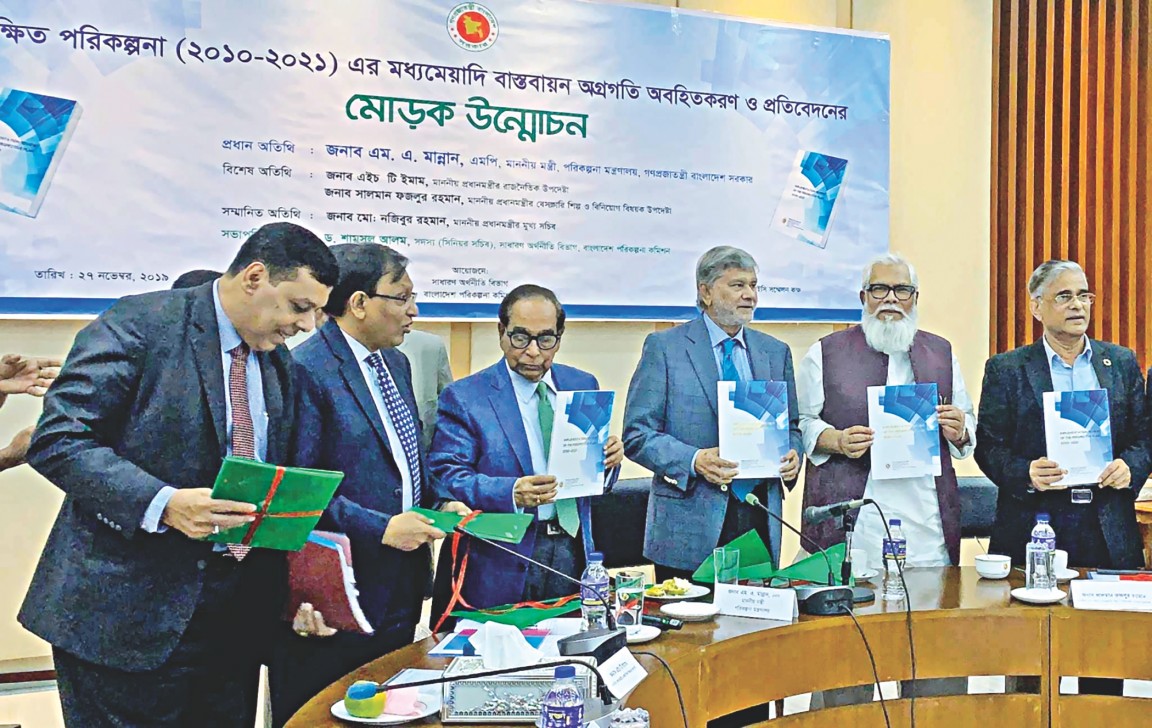Revenue, job creation dismal despite high GDP growth

Though the economy has been growing at a healthy pace in recent years, it has failed to raise revenue collection and private investment and create jobs as planned, according to a new government report.
“Considerable success was achieved on structural transformation,” according to the implementation review of the Perspective Plan 2010-2021.
It also identified a number of challenges which ought to be addressed in a systematic manner to realise the targets of the Seventh Five-Year Plan.
The General Economics Division (GED) of the planning commission launched the report at the conference room of the National Economic Council in the capital’s Sher-e-Bangla Nagar yesterday.
The report found three major disappointments in failure to increase the private sector investment as per target during the period, failure to increase the tax-to-GDP ratio, and slower pace of job creation.
There was also inability to increase allocations for education, health and social protection for the poor and the vulnerable.
“These shortfalls should serve as guidance for revamping of future strategies,” the report said, which reviewed the period from 2010-11 to 2017-18.
“While the overall fiscal management was prudent, the biggest disappointment was domestic revenue mobilisation,” Prof Shamsul Alam, a member of the GED, said while making a presentation on the report.
In the first three years of the plan, the revenue had shown some significant gains, but the buoyancy in tax revenue disappeared thereafter and recorded a declining trend during the remaining years (FY13-FY17).
“By 2014-15, the tax-to-GDP ratio fell to 8.5 percent, which was well below the FY10 level.”
The report credited the initial progress to some minor reforms related to the VAT system and the widening of the base for withholding of VAT and direct taxes at sources.
On the tax administration side, the first five years of the plan saw no systematic improvement due to the National Board of Revenue’s inability to automate the business process associated with VAT and direct tax administration.
It also said the VAT law, which was enacted in 2012, could not be implemented until 2017 due to political and business pressure.
Nevertheless, a very large pool of educated youth remained unemployed primarily due to much slower than planned job creation in manufacturing and modern services.
The manufacturing sector expanded at double digit rates but job creation in the sector was not enough to allow more rapid intake from the growing labour force as well as from low-income agriculture and informal services.
The report said the slowdown of employments in the garment sector since 2013 has been particularly problematic.
The situation became more difficult because of the shortage of skilled workforce, adoption of labour-saving technologies and an inevitable consequence of widespread automation in industry.
“The employment challenges require utmost policy attention during the remaining years of the Perspective Plan.”
On governance and institutional reform, the report said despite all the efforts, institutional development took place in an extremely slow process.
Policy initiatives are underway in all these areas but a big push is needed to strengthen the underlying institutions.
The strengthening of the financial sector is an immediate priority and with a strong political will, this can be achieved.
Speaking at the report launching, Planning Minister MA Mannan said overall development has improved and growth of GDP and per capita income increased during the period. According to him, 95 percent of the people have been brought under electricity coverage.
HT Imam, political affairs adviser to the prime minister, said 5 crore to 6 crore people are getting benefit from the social safety net programmes.
According to the report, rapid growth and progress in human development have allowed Bangladesh to sharply reduce poverty and secure the lower middle-income status in 2015. In 2018, Bangladesh met the thresholds to graduate from the least developed country status and is now on course to formally becoming a developing country by 2024.
“Going forward, while graduation out of the LDC status inspires hopes of greater prosperity, the transition also comes with the potential of economic shocks unless we make an assessment of possible countrywide impacts and make timely preparation for addressing any emerging challenges.”
About the private sector investment, the report said at the start of FY15, it was virtually stagnant at about 19 percent, prompting the government to aim to break out of the stagnation and target to raise it to 25 percent of the GDP.
“In reality, the increase was limited to only 2.4 percentage points and that was also primarily due to a revision in the base for the national accounts.”
The report said progress is mixed in energy diversification. On the positive side, good progress has been made in securing energy trade agreements with India.
“But progress in diversifying the sources of primary energy has been weak. As a result, the fuel mix targets for power generation will be missed by a large margin.”
“The biggest policy debacle has been the inability to adopt a comprehensive coal policy that has virtually stopped domestic coal extraction.”
Salman F Rahman, adviser to the prime minister on private industry and investment, also spoke.
